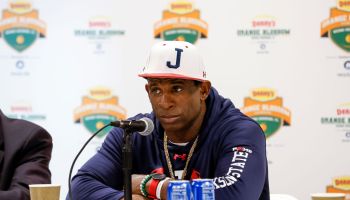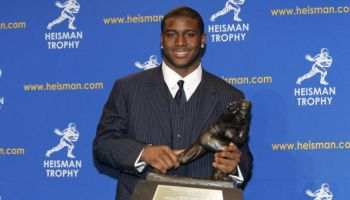“Well if you liked it, then you shoulda put a ring on it.”
And in one catchy lyric, Beyonce indirectly redefined the black feminist movement, and black female identity for a large segment of the population. Black men have long suffered the plight of being far behind our female counterparts in almost every imaginable way. The workforce has accepted Black women as less threatening aids to the male power structure, whether they are administrative workers or middle management executives. Rather than feel thwarted by limits to access, they have thrived as successful parts in a greater patriarchal machine. In that respect, instead of continuing the decades-old pity party, Beyonce Knowles has consistently implored us to step up our game to meet female offerings in tangible ways. In other words, ‘catch up or get left behind’ is the message.
Bey has never shied away from espousing the message of female empowerment. And in so doing, she opened up urban R&B music to topics and approaches that hadn’t been fully explored, and to the risk of treading heavily on sacred ground. Where Mary J. Blige and Lauryn Hill delved into the hip-hop influenced themes of pain, thuggish deceptive men, and the triumph of melancholy, Beyonce’s ballads are notably resilient. It’s as if the pain of oppressed womanhood hit her full on, and she simply reworked it to be a utility for her lyrical turns. Aretha Franklin pleaded for and demanded Respect, but her body of work was homed in on the idea of the apologetic, somewhat servile woman still seeking a Do Right Man. Because Beyonce has never been one to apologize for her feelings, the Black male backlash to her songs are palpable. The 2007 release of “Irreplaceable” stood as Ms. Knowles’s Alice Walker moment among black men. Although the uproar about The Color Purple (and later books like Waiting to Exhale) came from a valid complaint among Black men that we had been hung out to dry by everyone including Black women, and that airing out our deficiencies did not do as much to help our cause as it did to add to the already strong negative image in the public imagination, it was the undeniable hit of that year. Women of all races took to the idea of independence that didn’t just glorify the financial freedom of “Independent Women” or “Bills, Bills, Bills” but one of purely confident freedom from relationship obligations. Rather than signaling the departure from men, it was a more complex ode to how refreshingly vital mental solitude can be. Usher Raymond, for all his confessional crooning, has yet to reach that moment, diving from his relationship with one ex to his commitment to fatherhood. In a sense, Beyonce had shed many of the mainstream R&B songstress traits often associated with her image: pretty, elegant, and artistic were being overshadowed by outspoken and unforgiving. The “ring on it” anthem has larger implications about how marriage and ownership have been linked, and of the man trapping the woman or vice versa. Beyond that traditional meaning, though, it’s a thinly veiled demand for more responsibility on the part of men — men who had been long satisfied walking (if not running) away from marital attachments.
“My Husband’s the President…And?”
The First Marriage has a new complexion, but not just in the obvious racial newness of Barack and Michelle. The turnover from the Bushes to the Obamas also brings into view a woman who has inspired her peer group, and found strength in American stories that were once neglected. At first, the media, unaccustomed to seeing an educated, prominent Black woman, was unsure what to make of Michelle’s willingness to speak on any personal beliefs that grounded her family’s dedication to service. But, as a Today show interview revealed, she was a source of humility that girded her husband’s sometimes incredible ambitions. As the Obama campaign worked quickly and stridently to establish Michelle as America’s next mom, Mrs. Obama also mounted her own campaign to impart her intellectual and maternal values to those citizens. It was as if her surface message about marriage, family and service was a way of including wives and mothers in the national conversation about general improvement. The 44th President would be her husband, but that was incidental excitement in a sense.
Michelle Obama has been a dedicated servant in her career, acting as the Assistant to the Mayor of Chicago and then as the Executive Director of a non-profit before working with the Chicago Hospital system. Her extensive resume rivaled that of Barack Obama’s, in opposition to the often socialite-leaning credential of other First Ladies. But much like Beyonce Knowles, Michelle has been noted for her fashion sense, impeccable taste and comparisons to the late Jackie O. In other words, as she infused the female image with power, the reports about her more traditionally accepted feminine qualities increased in kind. For us to contrast her fiery undertones with her well-placed pleasantries would have been sin in the mission to get a Black man elected. Now, the imperatives of progress are in full flux. And Michelle Obama has shown that the “good wife” image can have infinite iterations, from necessary critic to vocal supporter to (maybe) policy influencer. Rather than getting too far ahead of the public’s readiness, Michelle O. has capably showed that the marital morality of “Put A Ring On It” isn’t limited to possessive entrapment but about shared goals strengthening any union. Where Beyonce’s found her liberation in outspokenness about independence, Michelle has refined the idea to place her independence in the power equation (whether intentionally or not).
Beyonce Knowles and Michelle Obama are the celebrity icons leading the way for a generation of men and women who must persistently question how gender bias has kept us from reaching our nation’s promise. Although their values actively challenge our mainstream roles, they are still confined to the obligations of those roles. Their stories will inform our own, and enable the kind of mental liberation that will benefit men, women and couples to come.
















